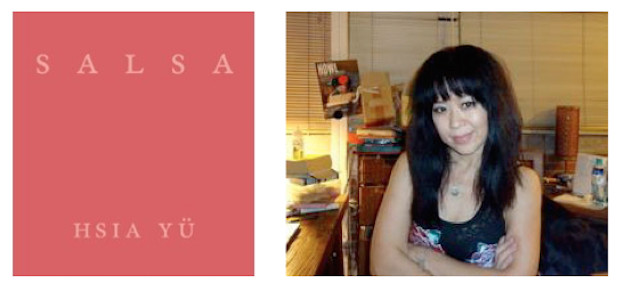Imaginative reading
A review of Hsia Yü's 'Salsa'

Salsa
Salsa
Of the Chinese avant-garde, Hsia Yü’s collections of poetry exemplify and perplex. The author of Pink Noise (2013), translated by Steve Bradbury, Yü had a new volume in translation released by Zephyr Press in 2014 — though originally published in 1999. A millennial dreamscape, Salsa asks its readers to follow the logic of order and the everyday so that they may become unfamiliar and distorted, the purl becoming unpurled.
In the first poem of this collection, Yü predicts the journey of the book: “Lovers [fall] to the status of kin.” She thwarts expectations and familiar images of heartbreak. What roots me through this surprise and spontaneity is knowing to keep an eye peeled for the destruction of the relationships and the “I”s that the speaker inhabits as a guiding principle. The death of a relationship is the root, the steady ground from which to consider her simple yet evocative diction.
In the poem “To Be Elsewhere,” Yü speaks of the arc of the text:
… In some other storyline
And so no one asks: Who are you looking so cold and worn?
And the other answers: All I know is the sweater I’m wearing has a loose thread
If you keep pulling it I fear
The whole of me will disappear (4)
With a foreshadowing of death and the close of this collection, we follow the poet’s path. The speaker will ultimately disappear into the world of memory, or that nowhere between people who first meet, then:
… three years later
They met again by chance.
But having been neglected by the narrative
For three whole years
They no longer knew who they were
Only a vague feeling they might have known each other. (4)
The relative semiotic ambiguity of the line “They no longer knew who they were” heightens the sense of nowhereness. The reader can interpret the line in two different ways: not knowing the self, or not knowing the lover. At the end of the poem, the disappearance of the speaker changes the meaning of the poem, a key strategy Yü employs in this text: a delayed explosion of understanding. Even the title of the connection is ambiguous in the same way: the reference to salsa deals both with the culinary or Latin American dance, and with the release of the title poem we understand the complicated dance steps Yü makes along the way.
Translator Steve Bradbury says in his endnotes that this collection can be seen as a post-impressionist Proustian poème-à-clef that lends itself to “imaginative readings.” For Bradbury, the importance of the poem is in its multiple significations and readings. It’s clear Bradbury preserved the musicality of the line, which is a feature of poetry that can be impossible yet imperative to translate given social distance and dissimilarities between linguistic groups. Preserving or transposing the sonorous quality of Taiwanese Chinese into English, Bradbury realizes Yü’s extraordinary wordplay. Take for example the poem “Soul”:
And then abruptly became oblivious
As for the awakening of this moment
Were a rain falling
We would become afraid our parting
Would stop the rain from
Falling there in the warm room
In the warmth of the warmth
Of the warmth of the room in the rain we are
Rarely unaware of how we waver (45)
The assonance and repetition of lateral liquids mimics a correspondence to the water cycle: the sense of return and incarnation suggests that the poet finds herself in similar situations, yet with seemingly new configurations, here at the end of her text. A metaphorical death.
Throughout this text Yü paints haunting images, yet indicates something deeper — something that compels the reader forward. She places us in the most familiar of settings but changes the configurations of objects, time, and space, resulting in the unfamiliar, or more accurately a haunting familiarity that she grapples with throughout these forty-six poems. In this unfamiliar space, the reader is forced into uncanny associations. Following Yü’s images, you will be surprised just where you will end up. These poems are roads that wend over cliffs and to the sea, through strange jungles without ever leaving the familiarity of the mundane cityscape. For instance, in “Jalousies,” the reader starts inside of a house and ends in a bagpipe:
When the wind blows the jalousies drone like a pump organ
The sea by the shore is like a crime you are reluctant to commit
When the wind blows basking in the sun is like an egg
About to burst its shell (7)
The ambiguity of what object actually becomes like an egg in the sun, the connection between the sea and a crime, the jalousie as a wind pump: all delight in their departure from conventional images, in effortless spontaneity. The reader journeys to the unfamiliar through these objects out of place, continuing on in bizarre fashion:
… He is a word I accidentally stumbled on
While looking for another word and so
Some things are no different than taking a piano in the middle of a concert
And the pianist and hurling them both at high velocity to the bottom of the sea
Not yet conscious of what had happened they continue on the ocean floor (7)
A person as a word, an amphibious piano concert, and semiotic ambiguity all work in tandem to create a dizziness that propels the reader forward. At times Yü’s work reads like a frenzy, a spiral into demise with the promise of rebirth. In fact, given Yü’s ideas on memory and temporality, I hardly expected the book’s delightful end: a treatise on the human soul, a familiar yet unfamiliar territory that the poet leads us down, pointing our strange sights along the way: everyday objects and beings somehow distorted.